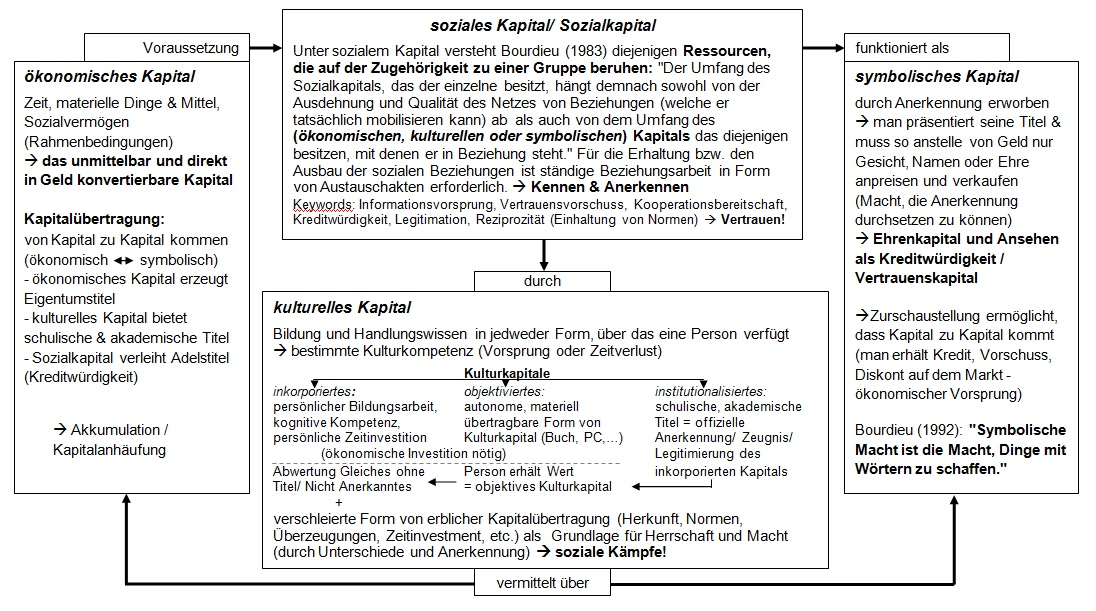Sorts of capital
According to Pierre Bourdieu , types of capital are the four components of a person's capital :
Types of capital decide on the position of the owner in class society , on placement in social space :
The types of capital economic capital , cultural capital and social capital together form the capital volume . This can be shown in a two-dimensional graphic as the vertical axis, while the relative orientation towards economic and cultural capital is shown on the horizontal axis. A third axis, the time axis, can be used to record the actor's career ( social origin and biography ). These three axes form the social space .
Types of capital can be exchanged for one another, but there are limits to this convertibility .
The types of capital are used in areas of society that Bourdieu calls social fields . In these fields there is a constant struggle for the value and convertibility of the individual types of capital. For example, in the field of education, tuition fees are controversial because the critics a. fear that the conversion of financial capital (tuition fees) into cultural capital (access to higher education and academic qualifications) and into social capital (belonging to the academic community of a university) will increase financial capital and devalue cultural capital . There is also a dispute about the value of individual types of capital (in the field of education, for example, the question of what educational titles and certificates are awarded for).
context
Almost all people live in some kind of relationship network. In this case, a network potentially has more resources available for mobilization than all the individual members of this network, since the rich relationships are still available to the resources of the people themselves. This is social capital - the scope and characteristics depend on the size and quality of the relationship network as well as the interlinking with economic and cultural capital. Social capital can only arise on the basis of trust and ensures that cooperation and mutual support can develop.
In different cultures, different cultural goods (objective cultural capital) are available that are appropriated by individuals to different degrees (incorporated cultural capital). In addition, each individual receives a certain recognition (institutionalized cultural capital) by observing social rules and norms in this network.
The symbolic capital - the term can be translated as prestige - consists in the ability to enforce this social recognition through habitus , lifestyle, body language, manners, clothing - through characteristics of social distinction - and to make the disposal of material, social and cultural capital perceptible . This makes it possible for the individual to build trust capital and z. B. to increase creditworthiness. This in turn has a direct impact on economic capital, i.e. on goods and financial resources that are made available by others (as an advance). This allows you to gain advantages over others and z. B. expand your cultural capital further and accumulate capital through even more recognition and trust.
So individuals can take advantage of social capital by giving them access to social resources (finance, education, etc.). Society in turn saves social costs by assuming services from relationship networks (neighbors, friends, clubs, etc.). In this process, not only do people receive recognition and value, but also the relationships between them.
literature
- Pierre Bourdieu: The Forms of Capital . In: Richardson, John G. (Ed.): Handbook of Theory and Research for the Sociology of Education . New York 1986, pp. 241-258.
- Pierre Bourdieu: Economic Capital - Cultural Capital - Social Capital. In: Pierre Bourdieu: The hidden mechanisms of power . VSA, Hamburg 1992, ISBN 3-87975-605-8 . Pp. 49-80.
- Pierre Bourdieu: The subtle differences. Critique of social judgment. (French 1979), Frankfurt a. M. 1982. ISBN 3-51828-258-1
- Pierre Bourdieu: economic capital, cultural capital, social capital. In: Reinhard Kreckel (ed.), »Social Inequality« ( Social World Special Volume 2), Göttingen 1983, pp. 183–198
Web links
- Gert Pickel: Pierre Bourdieu. Social, economic and cultural capital ( Memento from October 7, 2007 in the Internet Archive ) (slide presentation in Powerpoint format)
- Faculty of Social Sciences, University of Vienna - Werner Zips and Matthäus Rest: Basics of social science ways of thinking - forms of capital
- Mischa Mandl: Economic, cultural and social capital
